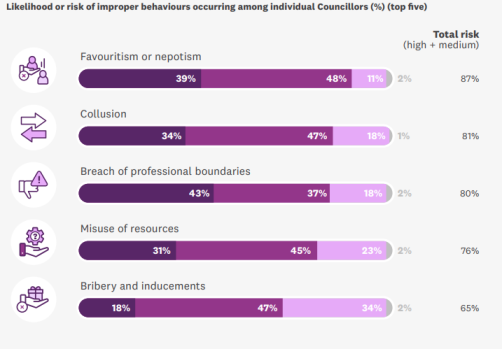Almost three quarters of Victorian councillors think corruption is a problem in the state, but the same proportion believe their council has a strong or moderate ethical culture, and only 14 per cent think their council is vulnerable to corruption.

Despite this, one in three councillors surveyed by the state’s public sector watchdog reported witnessing favouritism or nepotism at their Council in the last 12 months.
A slightly higher percentage of local government councillors think corruption is a problem than state MPs and local government employees, according to the survey.
A total of 131 councillors and 28 state MPs participated in IBAC’s voluntary online survey in May 2023, which asked about their perceptions of corruption.
The survey sought to gain an insight into what they knew about corruption, how prevalent they thought it was, and what their attitudes towards reporting it were.
High risk behaviour
Overall, 89 per cent of councillors agreed that corruption happens in Victoria and almost three in four considered it to be a problem in the state. Councillors (73 per cent) were more likely than MPs (68 per cent) and local government employees (62 per cent) to think corruption was a problem in Victoria.
Bullying/harassment, favouritism/nepotism, collusion and misuse of government resources where considered to be the most common risks facing councillors and MPs.
Almost a third of councillors said they had personally observed cases of favouritism or nepotism in the last 12 months at their Council and more than a quarter reported observing a breach of professional boundaries.
“Generally speaking, Councillors are more likely than other cohorts to have personally observed these behaviours compared to MPs or local government employees,” the report says.
“For example, 64 per cent have personally observed or suspected a breach of professional boundaries compared to 39 per cent of MPs and 37 per cent of local government employees.”

Most of the councillors said they know how to report corruption and almost all (94 per cent) said they’d do so if they saw it.
Advice from council governance teams is commonly relied on when seeking guidance on corruption, but half those surveyed agreed it was difficult to find definitive advice.
Overall, councillors appeared more aware of how to report corruption at 88 per cent, compared to 61 per cent of MPs.
IBAC Executive Director Prevention and Communication Dr Linda Timothy said the survey findings also revealed that some councillors and MPs were unclear when inappropriate behaviour tips over into corruption.
“If our elected officials are unsure what corruption looks like, then it can go unreported,” Dr Timothy said.
She said getting an insight into the views of elected representatives will make it easier to prevent and detect corruption across the public sector.
Ninety nine per cent rate honestly and integrity as being important to them.





Leave a Reply